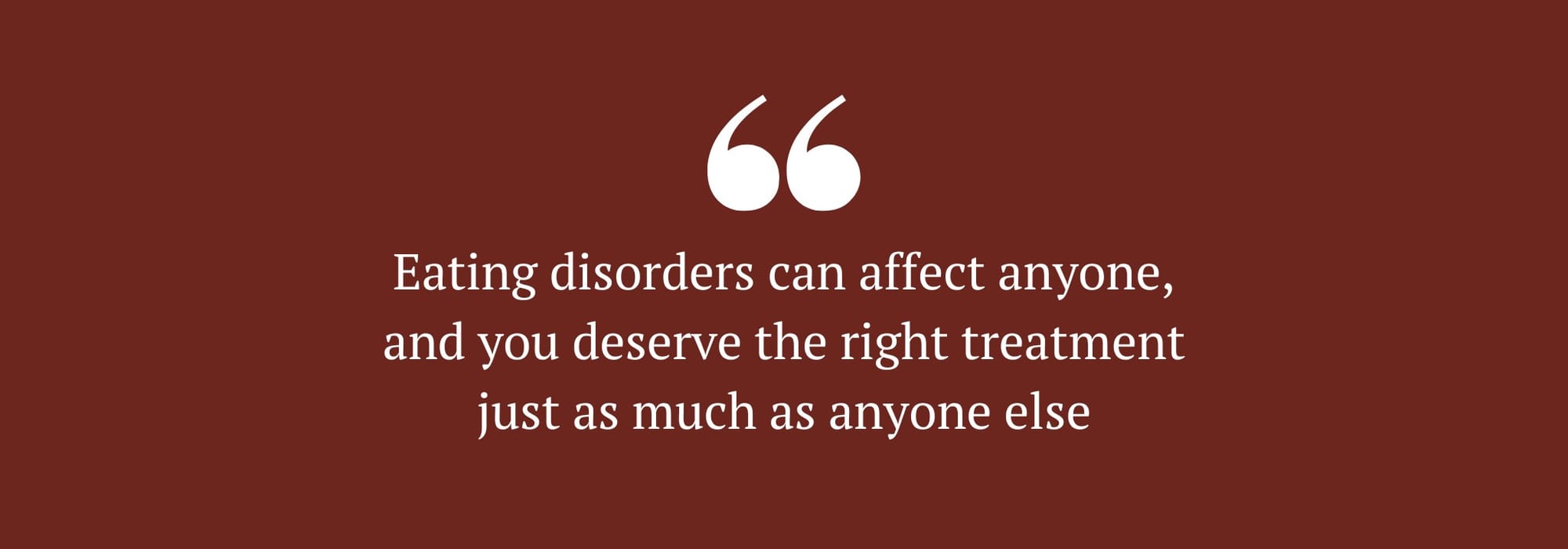Eating disorders later in life: Why research needs to be more inclusive
updated on Feb 7, 2024

What challenges affect older adults with eating disorders, and is a lack of diversity in research compounding the issue?
When you picture someone with an eating disorder, what comes to mind? For some, it’s likely that a particular type of person appears in their mind’s eye – a white teenage girl. While, of course, this can be true, eating disorders affect people of any age, race, or gender.
Slowly, progress is being made in terms of awareness, with more people understanding the variety of people that can be affected. Yet, there is still a gap in research.
“We’ve definitely seen a lack of diversity in eating disorder research, and while there has been more attention on the topic in recent years, there’s still a really long way to go,” Umairah Malik, clinical advice coordinator at eating disorder charity Beat explains.
“Research samples often include mostly young white women, while some studies don’t report their demographic data at all. This means that research findings are difficult to generalise, and there’s a lack of understanding on eating disorders in different groups, despite knowing that anyone from any background can be affected.”
This lack of research and understanding can fuel stereotypes, which may prevent people from reaching out for support. Looking at age specifically, Umairah explains how this misinformation can prevent people from finding the help they need.
“There’s a misconception that only young people can experience an eating disorder, which can mean that older people might not recognise the signs of an eating disorder in themselves or a loved one.”
Why is research so limited?
Early intervention is often highlighted, as getting support sooner in the eating disorder’s development can improve the chances of recovery. This could explain the research leaning towards younger people, because of the assumption that older people with eating disorders have had them for a long time. While this may be the case, this thinking fails to consider those who do develop an eating disorder later in life. And, regardless, shouldn’t we be looking into how to help those who have struggled long-term, too?
Another possible reason is the way organisations recruit research participants. They may rely on social media or eating disorder clinics, where there can be a younger demographic. But, whatever the prime cause, the problems resulting from a lack of inclusivity remain the same.
“A lack of diversity in research means that what we learn and know about eating disorders is based on groups of people who aren’t representative of everyone affected,” Umairah says. “This means that specific challenges or presentations in different groups aren’t understood and identified, which is why it’s so important for research to be more diverse.
“With more inclusive research, eating disorder treatments can become more effective for underserved groups, leading to improved experiences of treatment, and better outcomes.”

What can trigger an eating disorder later in life?
There can be a number of reasons why someone might develop an eating disorder at an older age. In mid-life and beyond, there can be a range of life events that turn our world upside-down, including bereavement, divorce, retirement, caring for ageing parents, and empty nest syndrome, to name a few For some, eating disorders become a coping mechanism to deal with difficult feelings triggered by these events.
Others may feel insecure about the way their body is changing as they age. They may then develop a fixation on their appearance, which can lead to an eating disorder – the preoccupation with youth in the beauty industry no doubt plays a role here.
Some may be put on medications that impact their appetite and weight, leading to a desire to control what suddenly feels out of control. Physical changes like menopause and male ageing can also have an effect on mental health, often triggering an increase in anxiety, which could lead to eating disorder behaviours for some.
These are all just examples and, for others, there may be different factors at play. Eating disorders are complex and often have multiple causes, no matter what stage of life you’re in.
What challenges can someone with an eating disorder face later in life?
While eating disorder symptoms can be very similar across different ages, the context in which they’re experienced is different. This can lead to specific challenges.
“People might be experiencing different life changes related to factors like caring for a loved one, working responsibilities, financial challenges, or changes like the menopause,” Umairah says. “Big life changes can be difficult to navigate; validating and recognising the experiences of people with an eating disorder later in life is so important.”
There can also be unique reasons holding an older adult back from getting help. They may feel like they should have their life ‘together’ and therefore be resistant to support. There could even be misdiagnoses if medical professionals aren’t thinking to look out for eating disorder signs.
Treatment for eating disorders from professionals is often needed for recovery. Due to the lack of research, there can be challenges for older people in the treatment space, too. They may struggle to navigate recovery alongside what else is going on in their lives, or they may lack the familial support younger people tend to have. The lack of agency during treatment can hit harder for independent adults, too.
This all highlights the need for more diversity in the research of eating disorders, and a move away from one-size-fits-all treatments. Despite this, however, it is so important to recognise that help is available. While it may not be perfect, it is a crucial step on the road to recovery.
Getting help
If you suspect yourself (or a loved one) is struggling with an eating disorder, Beat advises speaking to a GP as soon as possible, and asking for a referral to an eating disorder specialist.
“It’s important to know that eating disorders can affect anyone, and that you deserve the right treatment just as much as anyone else,” Umairah stresses. “If you’re worried that you might not be taken seriously, it’s important to speak to your treatment team about this, or our helpline is also available for any support or information related to eating disorders. Recovery is possible, and we want to reassure people that support is out there.”
England: 0808 801 0677
Scotland: 0808 801 0432
Wales: 0808 801 0433
Northern Ireland: 0808 801 0434
If you’re looking for tailored support, visit the Counselling Directory to find private therapists near you.

